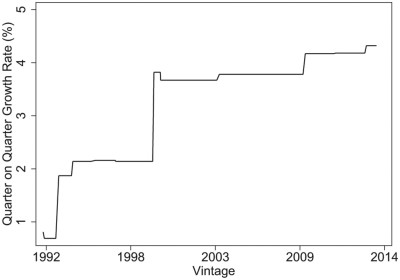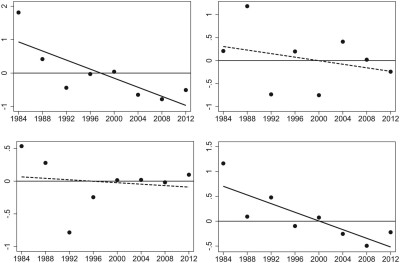Voters seem to respond to the the ‘reported’ rather than the ‘real’ economy
The economy was one of the defining issues of the recent General Election, which research suggesting that Labour’s relative reputational weakness was a reason behind their defeat. Here, Mark Kayser and Arndt Leininger show that voters often respond to the ‘reported’ state of the economy, rather than the actual economy – with democratic implications.

The Bank of England (Credit: Steve W, CC BY NC SA 2.0)
What was the rate of economic growth in the UK in the first quarter of this year? You probably do not know the exact number but it should be easy to look up, right? Just check the statistics at the Office for National Statistics (ONS). The answer, however, is not that simple. The first ‘preliminary’ estimate published on 28 April 2015 put economic growth in the first quarter (January to March 2015) at 0.3%. While the second estimate remained unchanged, the most recent estimate is 0.4% and will likely change with further updates.
Such revisions in macroeconomic estimates which often feature much more dramatic differences between revised and original data vintages, sometimes more than 100 per cent, are a standard feature of economic data. Therefore, economists are conscious of frequent and substantial data revisions and their implications for economic forecasts. Clearly, forecasting economic growth, for instance, requires an understanding that numbers for growth in recent quarters are also just estimates subject to revision.
Political scientists have been less aware of the difference between real-time data, the initial data release that receives the most attention in the press, and vintage data, that is subsequent revisions. However, they may well be politically relevant. What if economic estimates available before an election differ dramatically from those available after the election.
Possibly in no race has this been clearer than the 1992 US presidential race between George H. W. Bush and Bill Clinton. Media reports and public opinion at the time reflected rather dismal initial estimates about the state of the economy that official agencies would later revise upwards — in the case of second quarter growth, by a factor of five (Fig. 1). Bush Sr. complained bitterly that the economy was faring far better than the media, public, official statistics or the Clinton campaign depicted. Subsequent data revisions vindicated this claim — the economy was well into recovery during the campaign — but only after he had lost the election to a rival whose campaign slogan was “It’s the economy, stupid.” The media’s portrayal of the economy, rather than economic performance itself, seems to have cost Bush his reelection.
The economy plays a central role in explaining and predicting electoral outcomes. The so-called economic vote is one of the most researched, if not fully understood, phenomena in electoral politics. Voters reward governments during expansions and and punish them in recession with sufficient regularity that political scientists use macroeconomic data to forecast elections. For instance, in a October 2012 special issue of the journal ‘PS: Political Science & Politics’ on election forecasting, for example, 11 of 13 models employed the economy with growth rates being the most commonly used measure.
Scholars usually employ vintage data, with all its revisions, from the date when they run their analyses. If voters learn about the economy from direct experience, then using such revised economic estimates is indeed, albeit unwittingly, correct since revised economic figures more accurately reflect the true state of the economy. However, if voters learn about the economy from the media, then the initial economic reports, the real-time data, offer the most relevant economic information.
In our research, recently published in Research and Politics (ungated), we used the distinction between real-time and vintage data, not only to investigate the consequences of data revision on forecasting, but also as an opportunity to test how voters learn about the economy. To do so we replicated four forecasting models for US presidential elections with both vintage and real-time data. Our results revealed that revised data are not better data when it comes to capturing the underlying data generating process associated with voting. Despite more accurate estimation of economic conditions, on average using vintage data generated poorer of out-of-sample election predictions than using real-time data.
Moreover, later vintages introduce greater forecasting error. This suggests that error magnitude should increase under current forecasting practices as time series get longer and the average number of revisions to the data increases. For instance, as you can see in Fig. 2 when more recent elections are forecasted real-time data fares increasingly better than vintage data. Our findings suggest that voters respond more to initial economic estimates, that are heavily reported in the media, than to the economy itself.
Our results first and foremost argue for the use of real-time data when studying economic effects on politics but, short of that, they strengthen the argument for subjective economic measures (economic perceptions) in studies of the economic vote. The implications of data revisions for macroeconomic forecasting have received considerable attention in economics. We believe that this subject should also receive more attention in political science. However, while economists rely on data revision to improve their economic forecasts, political scientists are in most cases probably better off using unrevised real-time data.
—
This post represents the views of the author, and not those of Democratic Audit or the LSE. Please read our comments policy before posting.
—
 Mark Kayser is professor of applied quantitative methods and comparative politics at the Hertie School of Governance, Berlin. His research generally centres on elections and political economy. Current major projects focus on partisan responses to economic crisis, media reporting of the economy, and the effect or electoral competitiveness on incumbent behaviour. Before coming to the Hertie School of Governance, he served as an Assistant Professor of Political Science at the University of Rochester and as a postdoctoral Prize Research Fellow at Nuffield College, Oxford.
Mark Kayser is professor of applied quantitative methods and comparative politics at the Hertie School of Governance, Berlin. His research generally centres on elections and political economy. Current major projects focus on partisan responses to economic crisis, media reporting of the economy, and the effect or electoral competitiveness on incumbent behaviour. Before coming to the Hertie School of Governance, he served as an Assistant Professor of Political Science at the University of Rochester and as a postdoctoral Prize Research Fellow at Nuffield College, Oxford.
 Arndt Leininger is a doctoral student at the Hertie School of Governance, Berlin. His areas of concentration are comparative politics and applied quantitative methods. He holds an MSc in Political Science and Political Economy from the London School of Economics and Political Science and a bachelor’s degree in political science from Free University Berlin. From 2012 to 2013 Arndt worked as parliamentary aide in the German Bundestag. Arndt’s research, including the article summarized here, can be found on his homepage. He tweets @a_leininger.
Arndt Leininger is a doctoral student at the Hertie School of Governance, Berlin. His areas of concentration are comparative politics and applied quantitative methods. He holds an MSc in Political Science and Political Economy from the London School of Economics and Political Science and a bachelor’s degree in political science from Free University Berlin. From 2012 to 2013 Arndt worked as parliamentary aide in the German Bundestag. Arndt’s research, including the article summarized here, can be found on his homepage. He tweets @a_leininger.







 Democratic Audit's core funding is provided by the Joseph Rowntree Charitable Trust. Additional funding is provided by the London School of Economics.
Democratic Audit's core funding is provided by the Joseph Rowntree Charitable Trust. Additional funding is provided by the London School of Economics.
Voters seem to respond to the the ‘reported’ rather than the ‘real’ economy : Democratic Audit UK https://t.co/eh2qUlyodG
@Peston Voters seem to respond to the the ‘reported’ rather than the ‘real’ economy https://t.co/9FHIzC7Zz8
[…] first sight the research reported here is something that only political science researchers should worry about. In trying to explain […]
Voters seem to respond to the the ‘reported’ rather than the ‘real’ economy https://t.co/hExIe1GiPH
The effect that the ‘reported’ (rather than ‘actual’) state of economy has on #voters https://t.co/ejaZcfrQwq @democraticaudit @a_leininger
Voters seem to respond to the the ‘reported’ rather than the ‘real’ economy https://t.co/5w3vjPfG36 argue @a_leininger & @kayserma
[…] Voters seem to respond to the the ‘reported’ rather than the ‘real’ economy. […]
Fascinating: reported economy more important than ‘real’ economic performance when voting. Raises issues for Riker https://t.co/rHu3anesFu
Voters seem to respond to the the ‘reported’ rather than the ‘real’ economy https://t.co/Hw7FzSESEn #Option2Spoil
Voters seem to respond to the the ‘reported’ rather than the ‘real’ economy https://t.co/xJZryQafzR https://t.co/lxRWbuI7qR